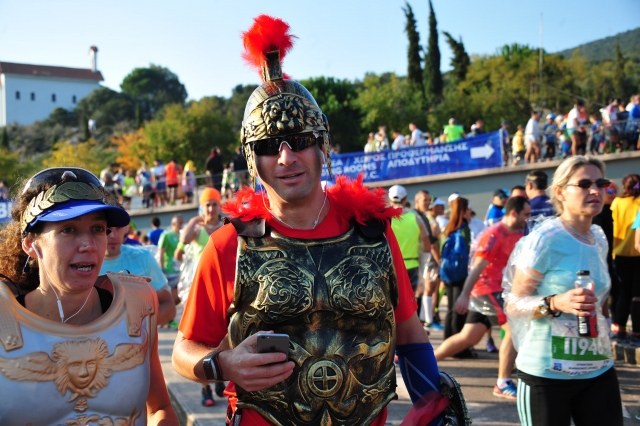photos www.iefimerida.gr
This year, over 43,000 people took part in the Athens marathon, thus setting a record in the way of entry numbers.
With a time of 2:21:22, Greece's Christoforos Merousis became the winner in the men's race. Minori Hayakuri from Japan took the women's title with 2:52:06.
This is the first victory of a Greek marathon runner in a long time. The first winner of the International Classic Marathon was Theofanis Tsimigatos. Back in 1983, he finished with a time of 2:28:18. Nikos Polias was the Greek runner with the highest number of titles (in 1993, 1995, 1998, 2000). And 2000 was the year when the last Greek victory took place. The past 15 years have seen the prize going to Kenyan runners, with the exception of 2003, when a Tanzanian prevailed, and 2011, when it went to a Moroccan.

In the women's race, the first Greek winner was Metaxia Bertselea in 1983 with 3:35:52. The last Greek female victory was also in 2000 when Georgia Abadzidou crossed the finish line after 2:53:00.
In the Greek ranking of athletes, Polias again leads: he is the best Greek performer in the seven marathon races. For the women, this is Abadzidou, also with 7 wins, and Magda Gazea with 11 medals in 11 events.
A marathon on the classic route was organised for the first time at the First Greek athletic championship, just before the 1896 Olympics. The winner back then was Charilaos Vassilakos who finished second after Spiridon Louis at the subsequent Olympics.
The best results on the classic route were achieved by Kenyan Felix Kandie with 2:10:37 in the 2014 race, and for women by Mizuki Noguchi of Japan with a time of 2:26:20 at the 2004 Olympics.

The best result for a Greek runner belongs to Nikos Polias – 2:17:56, achieved in 2004, and to Maria Polizou in the women's race – 2:39:10 at the 1997 World Cup.
The idea of restoring the classic marathon and its inclusion in the Olympic Games belongs to the Frenchman Michel Breal, linguist and Hellenist, a friend of Pierre de Coubertin. He suggested a repeat of "that famous journey made by the soldier in Marathon" at the 1896 Olympics. It is believed that although Breal had published books on ancient Greek history and mythology, when making his proposal, he actually did not know the exact length of the route. Once having found out it was in excess of 40 km, Breal tried to retract his proposal. But it was too late as the race was already included in the Olympic programme, and the latter had been sent out to many countries. Eventually, Breal offered to sponsor the race while the Greek philanthropist Georgios Averof supplied the cup for the winner.

The history of the marathon dates back to antiquity. Right after the victory of the Athenian army over the Persian king Darius, the warlord Miltiades sent the messenger Pheidippides from Marathon to Athens to convey the news. According to sources, he ran all the way, entered the room where the parliament sat, uttered 'we won' and dropped dead. This story was told for the first time by Plutarch in his On the Glory of Athens from the 1st century AD. He called the messenger either Thersipus of Erchius or Eucles. Later on, in the 2nd century AD, Lucian gave his version of the story, but his runner was named Pheidippides. Herodotus, who is the main source on the Greco-Persian Wars, mentions Pheidippides as the messenger who ran from Athens to Sparta to ask for help, and then ran all the way back (an overall distance of 240 km). Herodotus makes no mention of a messenger sent from Marathon to Athens. He writes that the Athenian army was afraid that Persian ships might attack the unprotected Athens, which is why it hurried back to the city on the day of the battle.